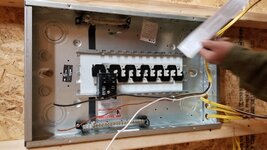hanau
Member
Started running my electric in my building.
Little confused on the neutral and ground.
If you look at the neutral bars they attached through a jumper ,(black thing)
Does the neutral and ground connect to the bars neutral on one side and ground on the opposite?
or do i buy a ground bar and install it in the panel?
I seen both ways on line.
Breaker box is not installed sideways, the picture turned on me when i uploaded it.
Little confused on the neutral and ground.
If you look at the neutral bars they attached through a jumper ,(black thing)
Does the neutral and ground connect to the bars neutral on one side and ground on the opposite?
or do i buy a ground bar and install it in the panel?
I seen both ways on line.
Breaker box is not installed sideways, the picture turned on me when i uploaded it.
Attachments
Last edited:

